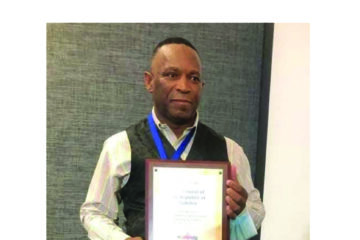In a field often dominated by men and hard hats, Zhahida Tjizera stands out not just for breaking barriers but for redefining what it means to build with purpose.
As a quantity surveyor, she measures more than bricks and mortar; she measures progress with perseverance and dedication.
From early dreams of shaping skylines to navigating construction sites and cost estimates with precision, Zhahida represents a new generation of Namibian women making their mark in technical professions.
Her story is one of quiet determination and bold ambition, a reminder that success in STEM and construction is not reserved for any gender but for those willing to put in the work.
In this week’s Young Observer, we spotlight Tjizera’s journey, the challenges she has faced, and how she continues to inspire young women to step confidently into spaces once considered off-limits.
Q: Tell us a bit about yourself and your upbringing.
A: My name is Zhahida Tjizera, I’m a quantity surveyor in training at Buhr Boltman & Partners Quantity Surveyors. I was born and raised in Namibia, and I’ve always been someone who believes in hard work, purpose, and creativity. I come from a close-knit family that values education and humility, which really shaped the person I am today. Growing up, I was always curious about how things were built. I’d find myself watching construction videos on YouTube longer than expected, wondering how everything came together.
Q: What first sparked your interest in quantity surveying?
A: It actually started from my love for beautiful houses, but not just the design side… I was fascinated by how projects are managed from start to finish. During my school years, I realised I wanted a career that combined both analytical and creative thinking, and quantity surveying offered exactly that balance.
Q: What was it like studying quantity surveying as a young woman in a mostly male field?
A: It was both challenging and empowering. Walking into lecture rooms where you’re one of only a few women can be intimidating at first, but I quickly realised that I deserve my seat. I’m just as good as any man in that room. Over time, I stopped seeing it as a male-dominated space and started seeing it as my space too.
Q: Did you face challenges during your studies because of gender perceptions?
A: Honestly, no. I’ve been fortunate to study and now work with men who truly respect women’s skills and contributions. The projects we deal with are far too significant for anyone to be focused on gender; what matters most is competence and delivery. I think that’s a reflection of the balance and equality our generation, especially Millennials and Gen Z, are bringing into the industry.
Q: Who or what helped you most during your academic journey?
A: My family and friends were my biggest pillar of support. They believed in me when I doubted myself.
Q: Are there any projects or experiences during your studies that shaped you most?
A: Yes, my dissertation on timber construction really shaped me. Exploring sustainable building in Namibia. It deepened my passion for renewable materials and made me realise how much potential Namibia has for greener construction methods, something that I’m still keen on bringing to life.
Q: How do you handle stereotypes or doubts about women in your field?
A: By staying grounded and focused. I’ve learnt that the best way to break stereotypes is to excel quietly and consistently. When people see results, perceptions change on their own. I also try to encourage other young women to take up space in this field; we belong here too.
Q: Have you had moments where you had to prove yourself more than male peers?
A: Not at all. In every project environment I’ve been part of, respect is earned through professionalism, not gender. I’ve always felt that I’m seen for the quality of my work, not for being a woman in a male space. That mindset shift where men and women work side by side as equals shows real progress in our field, and I’m proud to be part of that change.
Q: What personal qualities helped you succeed in this environment?
A: Resilience, humility, and curiosity. Resilience because you need to keep going even when things get tough; humility because you learn so much from every person on site; and curiosity because the industry is always evolving, and you can’t afford to stop learning.
Q: Who inspires you personally or professionally?
A: Personally, I’m inspired by every man and woman who wakes up every day and works towards achieving their goals. From the street vendors and marathon runners (though I’ll never take part, lol) to creatives and entrepreneurs, that daily commitment to progress really moves me.
Professionally, I haven’t met a woman in construction who I aspire to be, but I have met a man, my current boss. I’d like to become a female version of him: dedicated, meticulous, and passionate about quantity surveying.
Q: What keeps you motivated when challenges arise?
A: God. Prayer. Worship. That’s my foundation. Whenever I feel overwhelmed, I remind myself that my journey is bigger than me and that God placed me here for a reason.
Q: How do you stay confident in a male-dominated space?
A: By knowing who I am and what I bring to the table. I focus on that, not who’s in the room.
Q: What advice would you give young women wanting careers in male-dominated fields?
A: Go for it unapologetically. Don’t shrink yourself to fit in. Learn, ask questions, and stay curious. Most importantly, trust your ability. You don’t have to be the loudest in the room to make an impact; your work will speak for you.
Q: What’s one thing you wish someone had told you before you started your journey?
A: That the learning doesn’t stop after graduation! I honestly thought securing a job was the final step, only to find out I’d have to do logbooks for another 4–5 years before becoming a professional quantity surveyor. It’s a humbling process but also a rewarding one.
Q: How can schools or communities better support young women entering technical professions?
A: By creating more exposure and mentorship opportunities early on. Career fairs, site visits, and workshops can make a huge difference. Sometimes young women just need to see someone who looks like them doing it to believe it’s possible.
Q: How do you hope to influence other young women in Namibia through your work?
A: I want them to see that you can be soft, feminine, and still thrive in technical spaces. I hope my journey shows that discipline and grace can co-exist and that you don’t have to change who you are to succeed in construction.




